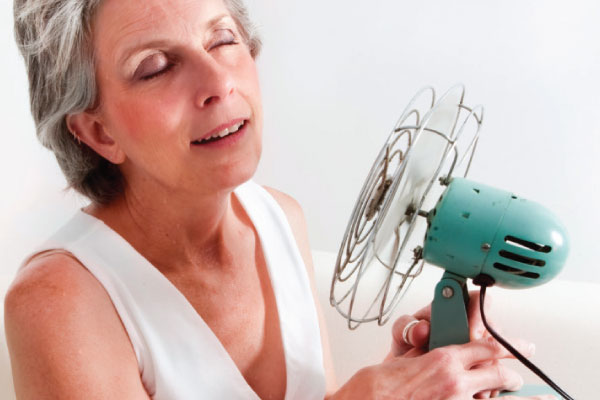Dr Jiana Harith Darwish is a paediatric allergy specialist and clinical immunology fellow at the King Faisal Specialist Hospital and Research Center. Each month she answers your health questions.
The weather has suddenly turned and I am finding it very difficult to sleep. I am 47 and think I may be menopausal as I keep getting heavy sweats. How do I find out? And how do I control these symptoms? I’m not keen on taking HRT as I have heard the production method is very cruel to animals?
Anecdotally, women often say they experience menopause around the same age as their mothers did, so that can be a benchmark for predicting your likely menopause age. The earliest sign of menopause will usually be a change in the pattern of your menstrual cycle. You may experience lighter or heavier periods and their frequency may also be affected. You may have your period every fortnight or you may not have one for months at a time. Hot flushes come on suddenly and feel like a rush of intense heat radiating through your body from an internal source. You may find yourself flushed and sweating afterward. Night sweats, on the other hand, usually occur while you are sleeping. It’s only when you wake up drenched in sweat that you recognise what has happened. You need to have your thyroid examined and it’s function checked with a simple blood test, because it may be the reason behind the heavy sweats. Alter your environment – to relieve hot flashes and night sweats, create a cooler environment using fans or air conditioning, dress in layers so you can remove them as needed and drink plenty of cool water. Try omega-3 fatty acids. Taking 2g per day halves the severity of hot flashes, and had a positive effect in 70 per cent of women taking these supplements. Vitamin E can also reduce the frequency and severity of hot flashes, as can acupuncture, which achieved a marked clinical improvement with 12 sessions compared with the customary care. The herbal supplement Fernal was twice as effectual as a placebo in reducing flushes in one trial of 54 menopausal women. Also, the herb black cohosh has a long tradition of use, and can help with flushes and mood swings. It’s so effective that Germany’s health regulator has approved its use at 40mg per day. There have been concerns, though, that it might worsen the spread of breast cancer, so women with a family history of the disease should perhaps think twice
The first brand of HRT was Premarin, made up of conjugated equine estrogens. In fact, it’s name is derived from PREgnant MARes’ urine. It was approved in 1942.
HRT Indications:
• relief of menopausal symptoms (short-term)
• prevention/treatment of osteoporosis (long-term)
• premature ovarian failure
Other possible benefits include the reduction in risk of colonic cancer, macular degeneration and cataract formation, with improved dentition and skin healing – these are still controversial and not seen as indications
HRT Contraindications:
• pregnancy
• undiagnosed abnormal vaginal bleeding
• active thromboembolic disorder or acute-phase myocardial infarction
• suspected or active breast or endometrial cancer
• active liver disease with abnormal liver function tests
• porphyria cutanea tarda (skin condition).
My last medical check-up showed my blood pressure had risen, quite substantially. I’m otherwise healthy and don’t want to be on medication for life. Is there a way I can bring it back down?
Your blood pressure is the force exerted by your heart, against the resistance created by the arteries, to keep blood flowing through your body. Your blood pressure is high (hypertension) when the force is excessive.
If significantly elevated, it increases the risk for heart disease, stroke or kidney damage. A healthy lifestyle is fundamental to prevent hypertension and to manage it when it develops:
• (DASH) diet high in fruits, vegetables, low-fat dairy products, potassium and calcium; low in cholesterol and saturated fat. It reduces the pressure generated by each heartbeat.
• Keep your dietary sodium below 2.4g daily.
• Following the DASH diet and reducing sodium to 1.6g daily can lower blood pressure as much as monotherapy with an antihypertensive.
• If you consume alcohol, keep the daily alcohol intake below 30mL – two drinks – in men or 15mL in women.
• Aerobic exercise for at least 30 minutes daily on most days.
• Achieve and maintain normal body weight.
• For overall cardiovascular risk reduction, if you smoke you need to quit. I highly recommend you read Allen Carr’s Easyway to Stop Smoking.
If you have a question for Dr Jinan, please email [email protected]





































